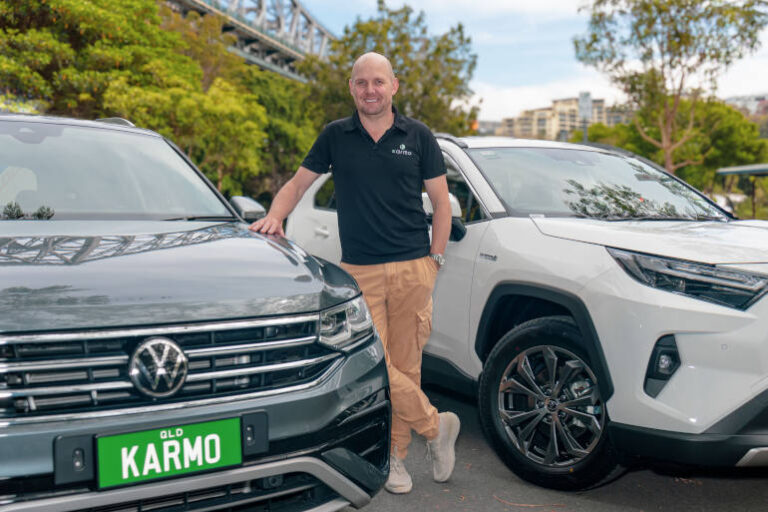In an exclusive interview with Fleet News Group, Karmo Founder and CEO Nick Boucher opened up about the company’s strategy to grow car subscription in Australia—and how the acquisition of competitor Motopool has cemented Karmo’s position as the market leader.
“There were multiple players in the subscription space in Australia—Motopool and ourselves, Karmo, were the two biggest players,” said Boucher. “We were probably the most quiet out of all the players, but from a volume perspective, we were the biggest.”
The merger of Karmo and Motopool, announced in 2024, has created Australia’s largest car subscription business. More than just scale, Boucher says the deal brought strategic value. “We picked up two fantastic execs in Andrew Rickett and Laura Harewood with vast, large fleet experience. That was probably the part we missed a little bit.”
Profitability, Not Just Growth
While other subscription businesses have struggled to find a sustainable business model, Boucher says Karmo is already ahead. “We’ve always been a profitable business, so we’ve never had that issue,” he said. “Motopool was too. So yeah, bringing the two together—very similar business models—we found a pretty great formula for success.”
A key to that success lies in the company’s approach to managing assets. “Every one of our cars is rotated within 12 months. We have customers that have been with us for four or five years and have had 10 different cars in that stage.”
It’s a deliberate strategy. “We don’t want people staying in a car like a lease. We want them enjoying new vehicles and different things. We think that’s the client that likes car subscription.”
Subscription Works for Fleets and EVs
Boucher sees significant opportunity in the fleet market. “Procurement Managers, Fleet Managers have really just used traditional methods. What subscription does, especially Karmo subscription, is give a unique offering around cars, utes, vans—and also electric vehicles.”
He adds, “If they’re (Fleet Managers) not doing a good job there, and they’ve got 50 cars lying around because the project finished three months ago—but they’ve got a five-year lease—it just doesn’t make much sense. They have dormant fleet. That’s the beauty of subscription.”
Another reason fleets are exploring Karmo’s offering is compliance with accounting standards. “Operating leases aren’t as appealing since 2018 when the ruling came out that they had to go back on the balance sheet,” said Boucher. “They kind of fell off a cliff.”
Electric vehicles, too, are a natural fit. “I’m a big advocate of EVs,” said Boucher. “We’ve actually, in the last four weeks, signed up another three Chinese EV manufacturers that are coming in. They look at us as a platform to get into the subscription space.”
Residual values, often a challenge in fleet EV adoption, are easier to manage with Karmo’s model. “We can mitigate probably the biggest risk for fleet at the moment, which is that residual risk. There’s just one payment—they don’t worry about it.”
The company recently signed a partnership with JET Charge to support EV charging for fleet customers.
Novated Subscription: A New Salary Packaging Tool
Karmo is also preparing to launch a novated subscription model. “We’ve got some really exciting news shortly that we’ll be announcing with a major partner around novated subscription, across all cars—ICE and EV,” Boucher revealed.
The solution is designed for employees who fall outside the usual lending criteria. “It could be a perfect gap filler for new employees, skilled migrants on visas, or people wanting to take tax advantage of nice new cars every six or nine months.”
Boucher clarified the model: “We’ll leave the novated leasing for others—it’s not a space we play in. But novated subscription—we will be the operators of the subscription, and there’ll be a fleet management organisation that will run the typical management of that novation.”
The Secret Sauce: Managing Residuals
At the core of Karmo’s business model is smart asset management. “That’s my secret sauce. That’s my 11 spices,” Boucher joked. “We rotate our cars typically under 12 months—anywhere between six to 12 months.”
It’s a strategy born from Boucher’s automotive background. “I’ve got 18 years in dealership space. I started off as a sales trainee and worked myself up to General Manager. We grew used cars from 40 to 200 units.”
That experience gives Karmo an edge. “We’ve been able to figure out a model that enables us to get our pricing on new cars down to something that is comparable to car ownership. That was really important. Because if we couldn’t do that, I don’t think subscription becomes sustainable—for the business, or for the consumer or fleet operator.”
With around 70 staff across offices in Perth, Adelaide, Melbourne, Sydney and Brisbane, and a back-office team in Sri Lanka, Karmo is scaling with confidence.
“Our determination is really to get people to Karmo for their next car,” said Boucher. “We want to make car subscription synonymous with Karmo.”






